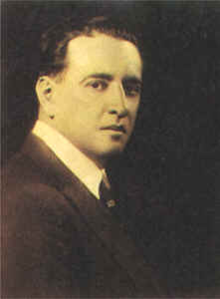Jose Eustasio Rivera
| José Eustasio Rivera Salas | |
|---|---|
 |
|
| Born |
February 19, 1888 Rivera, Huila, Colombia |
| Died | December 1, 1928 (aged 40) New York City, United States |
| Resting place | Central Cemetery of Bogotá |
| Occupation | Lawyer |
| Language | Colombian Spanish |
| Nationality | Colombian |
| Alma mater | National University of Colombia (B.A.) |
| Period | 1924-1928 |
| Genre | Novel |
| Literary movement | Modernismo |
| Notable works | The Vortex |
José Eustasio Rivera Salas (February 19, 1888 - December 1, 1928) was a Colombian lawyer and poet primarily known for his national epic The Vortex.
José Eustasio Rivera was born on February 19, 1888 in Aguas Calientes, a hamlet of the city of Neiva, later that year the hamlet was incorporated into the newly created municipality of San Mateo, which was later renamed Rivera in honour of José Eustasio. His parents were Eustasio Rivera Escobar and Catalina Salas, and he was the first boy and fifth child out of eleven children, out of which eight made into adulthood, José Eustasio, Luis Enrique, Margarita, Virginia, Laura, Susana, Julia and Ernestina.
In spite of his family's economic situation, he received a catholic education thanks to the help of other relatives and his own efforts. He attended Santa Librada school in Neiva and San Luis Gonzaga in Elías. In 1906 he received a scholarship to study at the normal school in Bogotá. In 1909, after graduating, he moved to Ibagué where he worked as a school inspector. In 1912 he enrolled at the Faculty of Law and Political Sciences of National University, graduating as a lawyer in 1917.
After a failed attempt to be elected for the senate, he was appointed Legal Secretary of the Colombo-Venezuelan Border Commission to determine the limits with Venezuela, there he had the opportunity to travel through the Colombian jungles, rivers, and mountains, giving him a first hand experience of the subjects he would later write. Disappointed with the lack of resources offered by his government for his trip, he abandoned the commission and continued travelling on his own. He later rejoined the commission, but before that he went to Brazil, where he became acquainted with the work of important Brazilian writers of his time, particularly Euclides da Cunha. In this venture he became familiar with life in the Colombian plains and with problems related to the extraction of rubber in the Amazon jungle, a matter that would be central in his major work, La vorágine (1924) (translated as The Vortex), now considered one of the most important novels in Latin American literary history. To write this novel he read extensively about the situation of rubber workers in the Amazon basin.
...
Wikipedia
